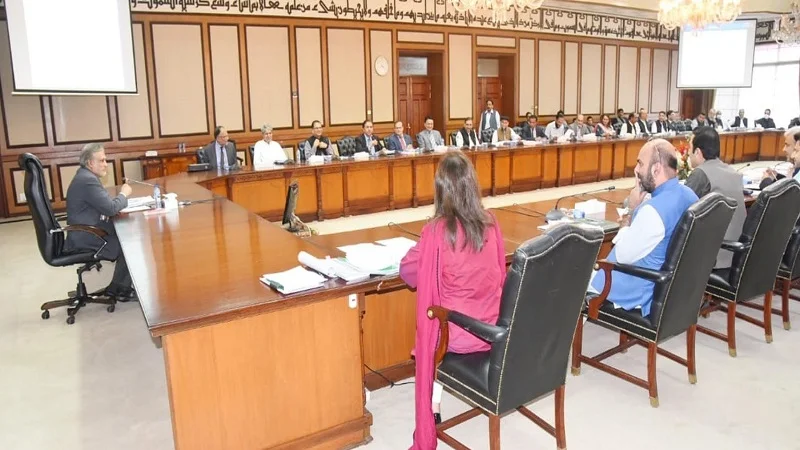The Executive Committee of the National Economic Council (ECNEC) approved projects worth billions of rupees relating to energy, education, communication, food security and agriculture sectors of the country.
Federal Minister for Finance and Revenue Senator Mohammad Ishaq Dar chaired the ECNEC meeting, according to a press statement issued by the finance ministry here.
Among others, the ECNEC meeting was attended by Federal Minister for Planning, Development and Special Initiatives Ahsan Iqbal, Minister for Commerce Syed Naveed Qamar, Finance Minister Khyber Pakhtunkhwa Taimur Saleem Khan Jhagra; Finance Minister Punjab Mohammad Mohsin Leghari, Senator Nisar Ahmed Khuhro, federal secretaries and other senior officers.
According to the press statement, ECNEC approved a 500 KV Sialkot Substation project of the Ministry of Energy (Power Division) funded by the French Development Agency (AFD) at a total estimated cost of Rs. 31,820.66 million.
The amount includes a foreign exchange component (FEC) of Rs. 17,202.32 million subject to a review of cost in the next three months according to the exchange rate of the dollar.
The main object of the project is the construction of a 500 KV substation at Sialkot with associated transmission lines to meet the additional load demand and voltage profile improvement of areas which fall under the jurisdiction of Gujranwala Electric Power supply Company (GEPCO).
The committee approved the project of the Power Division on the Addition and Augmentation of 500 KV and 220 KV Transformers at the Existing Grid Stations for the removal of NTDC system constraints at a rationalised cost of Rs. 15,112.05 million including FEC of Rs. 8,926.30 million subject to review of cost in next three months according to the exchange rate of the dollar.
The project is funded by Asian Development Bank (ADB) and is an addition of 2,250 MVA and 430 MVA capacity in the system at six existing 500 kV; 220 kV Grid stations in Rahim Yar Khan, Faisalabad, Multan, Sheikhupura, Dadu, Kashmore districts to meet the power demand of the country in a minimum possible time period and to reduce system losses.
ECNEC also approved the project on the up-gradation of the existing 220 kV Vehari substation to a 500 kV Vehari Substation.
Read This
Ishaq Dar takes oath as Senator amid PTI’s protest
Most modern Gwadar int’l airport to be operational by 2023
Finance Ministry releases 75 years economic journey of Pakistan
The project cost is Rs. 17,106.12 million including FEC of Rs. 9,515.60 million subject to review of cost in the next three months according to the exchange rate of the dollar.
The project is funded by French Development Agency (AFD) to be completed in 41 months.
The committee also approved the construction of the Chasma Right Bank Canal Project at a cost of Rs. 189,606.428 million including FEC of Rs. 18,030.58 million with 65% finance contribution by the Federal Government and 35 per cent by the Government of Khyber Pakhtunkhwa.
The proposed canal is an off-taking from the Head Race channel of the chasma hydropower station at the right bank of the Chasma barrage.
ECNEC approved Naulong Multipurpose Dam Project at a revised cost of Rs. 43,797.000 million. Naulong Dam project consists of a 186 ft high and 2,996 ft long zoned earth-filled dam in district Jhal Magsi, Baluchistan on the Mula river with a total catchment area of 7485 sq. Km. The project will result in flood mitigation, socio-economic uplift and poverty reduction in the area.
ECNEC approved Higher Education Commission’s project Allama Muhammad Iqbal Scholarship for Afghan National Students at a rationalized cost of Rs. 12,702.340 million covering 4500 scholarships.
The project aimed at creating a core of talented and qualified manpower in order to meet shortage of trained human resources and improve the socioeconomic conditions in Afghanistan. It is expected to help in strengthening relations with a brotherly neighbouring country.
ECNEC approved a project of the Ministry of Communication on Dualization and Rehabilitation of Karachi- Quetta- Chaman Road ( N-25 ) from Karachi- Kararo and Wadh- Khuzdar at a cost of Rs. 74,716.226 million to be completed in 36 months. The project envisages the construction of an additional carriageway and dualization/rehabilitation/improvement of the existing carriageway from Karachi to Khuzdar.
ECNEC also approved the project of the Ministry of Communication on the Dualization of the Karao- Wadh section (83 km), and Kuchlak- Chaman section (104km) of the National Highway at a cost of 67,671.920 million to be completed in 18 months. The project envisages dualization/rehabilitation/ improvement of the existing carriageway National Highway N-25 Kararo to Wadh ( 83 km) section and Kuchlak to Chaman ( 104 km) section.
The committee also approved a project of the Ministry of Communication on Improvement and Widening of Chitral–Booni–Mastuj–Shandur Road (153 km) at a rationalized cost of Rs. 17,783.193 million. The project will be completed in 36 months while the revised project envisages the construction of 153 km long 2 –lane single carriageway starting from Chitral city, passing through the towns of Booni, Mastuj and ending near Shandur at the border of Khyber Pakhtunkhwa and Gilgit Baltistan.
The executive body approved the revised Lowari Road Tunnel, access Roads Project at the total rationalized cost of Rs. 27,960.48 million with an FEC of Rs. 4,273.970 million. The Lowari tunnel is part of National Highway N-45. It originates from Nowshera, passes through Mardan, Malakand, and Chakdara and culminates at Chitral while the project is located between the townships of Dir and Drosh connecting districts of Dir and Chitral. The project comprises two tunnels of length 8.5 km and 1,9 km, 04 bridges in a tunnel complex two portals and link access roads along with bridges.
ECNEC also approved the Locust Emergency and Food Security project of the Ministry of National Food Security and Research at an updated cost of Rs. 26,014.51 million including a government share of Rs. 4,000 million and a World Bank share of Rs. 22,014.51 million. The project will be implemented throughout Pakistan with an immediate focus on flood-affected areas. The objective of the project includes enhancing the country’s preparedness for combating future locust and other invasive pest attacks, enhancing the capacity of Federal and Provincial Plant Protection Departments and strengthening the national food security information management system.
ECNEC approved Govt of Punjab’s project on Punjab Resilient and Inclusive Agriculture Transformation (PRIAT) at a total cost of Rs, 74,757.60 million including a World Bank loan of Rs. 45,863.56 million. The project will be implemented throughout Punjab in five years for Community –driven Improvement of Water Conveyance and Application, Promotion of Climate Smart High-Value Production, Regenerative Agriculture, Crop Diversification, Agriculture Value addition and Inclusive Access to Markets.
Ministry of Planning, Development and Special Initiatives presented a summary on Instructions for Techno-Economic Feasible Studies and submitted that a feasibility study was a pre-requisite for the preparation of a major development project proposal on sound lines.
Instructions to carry out Techno-Economic Feasibility Studies have been improved in the light of comments of the stakeholders.
The ECNEC approved the CDWP recommendations that all provinces should have a Project Development Facility (PDF) Fund for provincial ADPs for conducting the feasibility of the projects.
The recommendations also included that feasibilities should be carried out for all major cities, focusing on ring roads, wastewater treatments, urban mass transit etc.
A stack of feasibility studies should be available to guide future investments. Improvements to the techno-economic feasibility framework/guidelines should be made in the light of comments of all key stakeholders before placing it for ECNEC approval while instructions for conducting feasibility studies shall be made a part of the Development Manual according to the CDWP recommendations.


